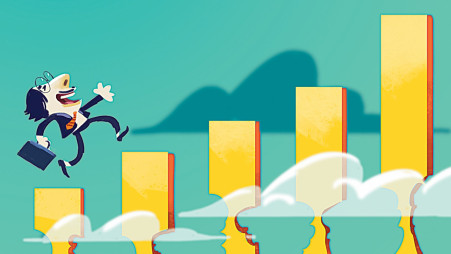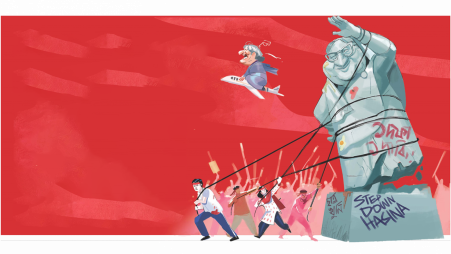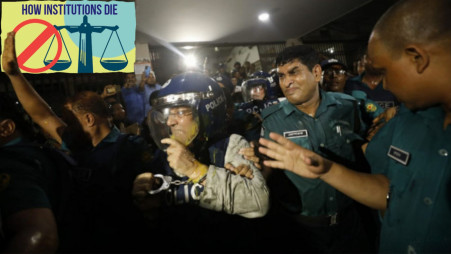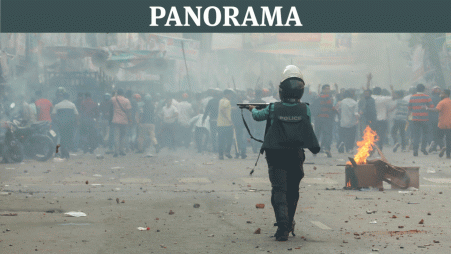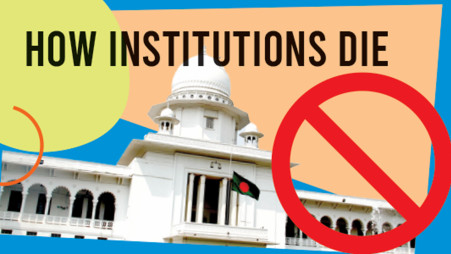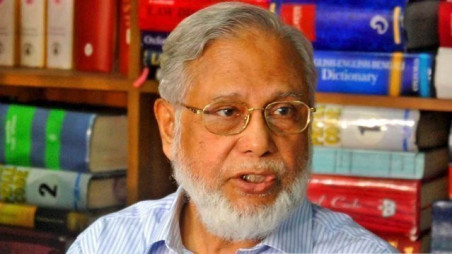How our freedom was fettered
Bangladesh was categorised as “Not Free” in 1975, the year when Sheikh Mujibur Rahman, introduced a one-party state banning all other political parties. The country got the status as ''Free'' over two decades ago only in 1991 and 1992–the years immediately after the fall of autocrat Gen Ershad regime. It has held the distinction of “partly free” persistently since 1993
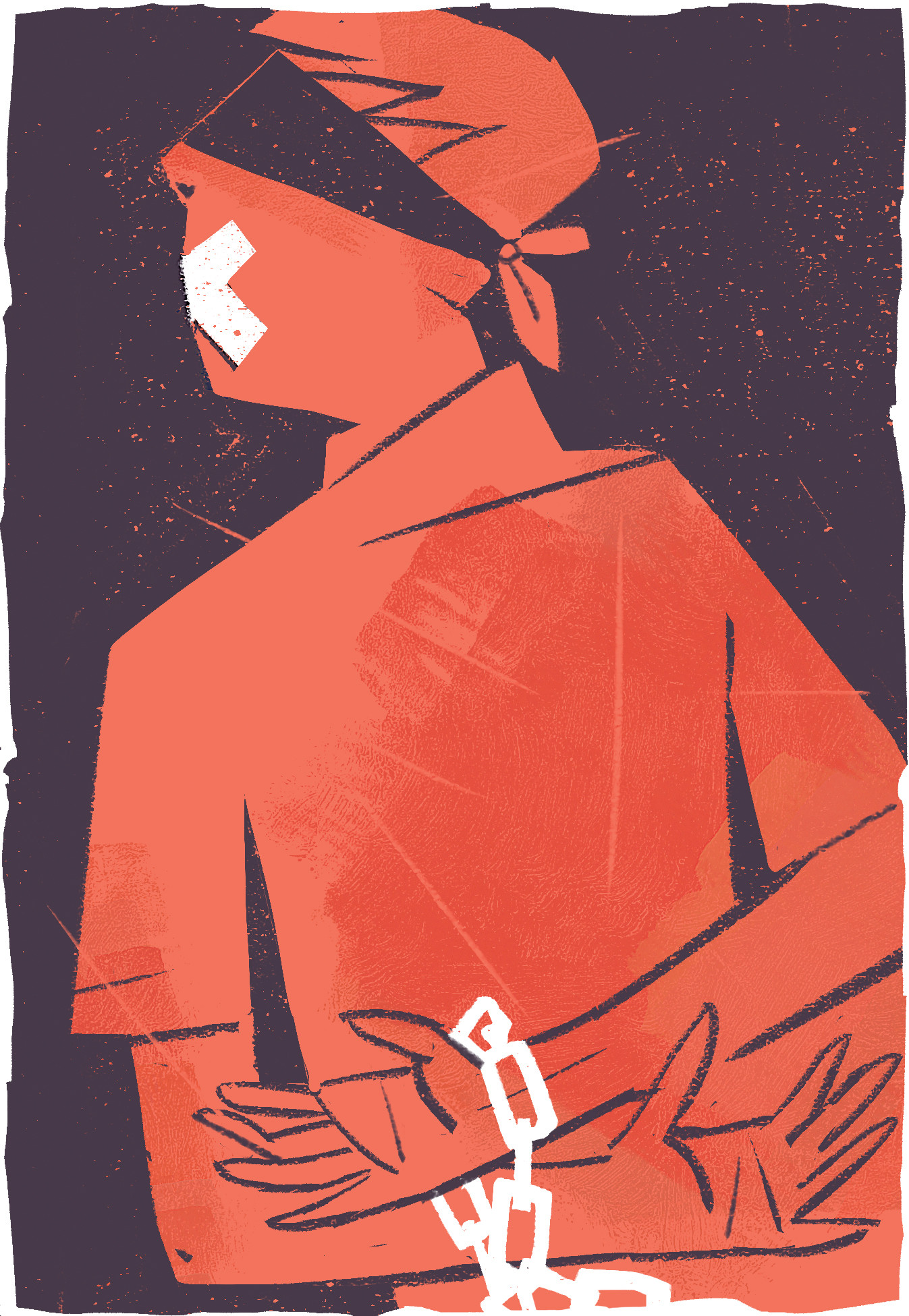
Bangladesh has been categorised as a "Free" country only for two years in the last 50 years. For the rest of the period, it has been categorised as "Partly Free" except one year when it was marked as "not free", according to data from Freedom House, a New York based non-profit organisation that monitors political rights and civil liberties around the world.
The compiled data of its review of the previous years since 1973 portrayed the gloomy picture of Bangladesh that fought a nine-month long bloody war for liberty and freedom after the previous two-decades long struggle for rights as citizens when it was a part of Pakistan since 1947 partition of India.
Power grab
The country was categorised as "Not Free" in 1975, the year when Sheikh Mujibur Rahman, through the Fourth Amendment to the Constitution introduced a one-party state banning all other political parties and shutting down all newspapers except four which were nationalised. He empowered himself to control the judiciary.
Though elected as a member of parliament two years before in 1973 parliamentary election to become the prime minister, he grabbed the office of the president for an indefinite period as the country was switched to the presidential form of government from parliamentary democracy. That was a big blow to independent Bangladesh.
After introduction of the non-partisan election time government (in 1996) in the Constitution, three more general elections were held under the system in June 1996, 2001 and 2008. But during this period, political culture turned confrontational. The law enforcement agencies and judiciary have gradually been made subjects to control by the government.
But that was just the beginning of another dark chapter to unfold soon. He was assassinated along with most of his family members, and his government was overthrown by a group of army officers. Martial law was imposed in Bangladesh within four years of its independence. The Constitution that guarantees people's civil and political rights was made subservient to martial law proclamation and order. The regime continued until April 1979.
After a break of just three years, General Ershad grabbed state power ousting an elected government in March 1982, and imposed martial law a second time in Bangladesh, which continued until November 1986. His regime even kept the entire constitution suspended for years. The country was run by the laws he made through issuing martial law orders. He emerged as an autocrat and stepped down in an uprising in December 1990, paving the way for restoration of democracy.
Free for two years
However, the period of two years when the country got the status as ''Free'' was over two decades ago only in 1991 and 1992–the years immediately after the fall of autocrat Gen Ershad regime who grabbed the state power in a military coup ousting the then democratically elected government in 1982.
The opposition political parties needed around eight years to oust him paving the way for restoration of democracy in Bangladesh. His ouster in December 1990 ushered in a new dawn of hope for people, political parties, professional bodies and others who joined hands in the anti-Ershad government movement in a broad based agreement to ensure people's freedom and liberty.
Bangladesh saw a smooth democratic transition. The parliament and the government formed in less than three months of Ershad's fall were on the right track to a large extent in the first two years to their commitment they had made during the movement. That brief period was really a honeymoon period of restored democracy.
In and outside of parliament both ruling and main opposition have yet to engage in any major political disagreement. Some contentious issues were raised in parliamentary business, but dialogue between the ruling and opposition helped to resolve the disputes. The law enforcement agencies were not abused to crush opposition and dissenting voices.
That a congenial atmosphere prevailed during the period, was reflected in the annual survey of political rights and civil liberties report [1992-93] by Freedom House. It observed that Bangladesh's democratic journey began with Ershad's resignation on 6 December 1990, following weeks of intense civilian protests against his authoritarian rule. The country's first untainted elections were held on 27 February 1991. Citizens changed their government in February 1991 in internationally observed elections that were generally free of violence. Bangladesh continued its relatively smooth democratic transition in 1992 under prime minister Khaleda Zia, it said.
"The judiciary is independent of the government, although the system is characterised by massive backlogs and corruption. Freedom of association is respected in practice. The press has operated with a new vigor since Ershad's fall. The country has 119 daily newspapers, 444 weeklies, and over 300 magazines, most of them launched after the 1991 elections," observed Freedom House.
Gathering clouds
Three decades down the line, Freedom House in its 2024 report on the freedom situation of the previous year, says the ruling Awami League (AL) has consolidated political power through sustained harassment of the opposition Bangladesh Nationalist Party (BNP) and those perceived to be allied with it, as well as of critical media and voices in civil society. Corruption is endemic, and anticorruption efforts have been weakened by politicized enforcement. Due process guarantees are poorly upheld and security forces violate human rights with near impunity."
So, Bangladesh scored only 40 out of 100 and has been categorised as "partly free", a dubious distinction it has held persistently since 1993.
How does a "Free" country look? Take the example of Finland, the lone country that scored 100 out of 100 and other countries that categorised as "Free" scored above 80.
"Finland's parliamentary system features free and fair elections and robust multiparty competition. Corruption is not a significant problem, and freedoms of speech, religion, and association are respected," observed Freedom House in its latest report.
It says: "The judiciary is independent under the constitution and in practice. Women and ethnic minority groups enjoy equal rights, though harassment, hate speech, and discrimination aimed at religious, racial, and ethnic minority groups does occur."
In Bangladesh, the democratic path began immediately after the fall of the autocratic Ershad regime. The political situation deteriorated fast. Country plunged into a political crisis over the mode of the election-time government. Amid the crisis, a one-sided election was held within five years of the first untainted election. A non-partisan election time government was introduced by the parliament formed through one-sided polls on 15 February 1996. After introduction of the non-partisan election time government in the Constitution, three more general elections were held under the system in June 1996, 2001 and 2008. But during this period, political culture turned confrontational. The law enforcement agencies and judiciary have gradually been made subjects to control by the government.
Building an obsequious state machine
Finally, Sheikh Hasina in 2011, abolished the non-partisan interim government that ensured free and fair elections, destroying a settled issue. Three elections were held under her government in 2014, 2018 and 2024 only to give her 'legitimacy' to retain power, denying people political rights to vote. Key institutions such as the judiciary, the law enforcement agency and civil bureaucracy have been excessively politicised, with partisan appointments to be obsequious to Hasina enabling her to cling to power. Protests and dissenting voices against the Hasina regime were crushed. Rampant corruption, extra-judicial killings and other incidents of violation of human rights became common incidents during her regime. People loyal to her allegedly abused powers and indulged in corruption with impunity.
In the process of the rise of Hasina as a despot, people lost their freedom and liberty. A relevant question to ask here would be: What is liberty and freedom?
The Oxford dictionary defines liberty and freedom as: "The state of being free within society from oppressive restrictions imposed by authority on one's way of life, behaviour, or political views." while freedom is defined as "The power or right to act, speak, or think as one wants."
Political rights allow individuals to participate freely in the political system including voting and holding public office. Unfortunately, elections were enforced by the disappearance of disenfranchising people.
Freedom of speech, which is the most important freedom, came under brutal attacks during the Hasina regime. This is the freedom which helps citizens to discover truth as people explore alternative ideas when they are free. People develop the virtues of tolerance and open-mindedness only when they are free to hear disagreeable ideas.
Appalling scores on freedom
Apart from Freedom House index, Bangladesh performed poorly on Freedom Index and 99th on the Prosperity Index by Atlantic Council, an American think tank.
In its last report released in April this year, Bangladesh falls behind its neighbours in political and legal freedom, but marks noteworthy progress in prosperity which has helped it reduce the gap with others in South and Central Asia.
In its report, the Atlantic Council places Bangladesh in the categories of "mostly unfree" and "mostly unprosperous" countries.
Of the 164 countries reviewed, Bangladesh has been positioned 141st on the index and 99th on the Prosperity Index.
It is because of the sorry state of governance, Bangladesh performs poorly on other indices such the freedom of the press index by Reporters without Border, Corruption Perception index by Transparency International, Rule of Law index by World Justice Project, Economic Freedom index by The Heritage Foundation and Human Freedom Index by The Human Freedom Index is co-published by the Cato Institute, the Fraser Institute, and the liberals Institute at the Friedrich Naumann Foundation for Freedom.
The Human Freedom Index 2024 on which Bangladesh scored poor 5.51 out of 10 on human freedom, 5.3 for personal freedom and 5.83 for economic freedom
In the report it says "human freedom is an inherently valuable social concept that recognizes the dignity of individuals. Human freedom enables and empowers people to do as they please, free from constraints or punishments, so long as it does not impinge upon the freedom of another. Human freedom plays a huge role in human progress."
Unfortunately, Bangladesh was liberated in 1971 after a bloody nine-month war. But its people were denied liberty and people by successive governments over the years.
In the last 15 years, the regime of Sheikh Hasina was the most brutal in denying people liberty and freedom. It's noteworthy that students who waged the vigorous protests forcing her to resign and flee the country grew during her regime that denied them liberty and freedom. Those who became eligible to exercise political rights to elect their representatives were disenfranchised as she held three stage managed elections in 2014, 2018 and 2024. They have no memory of a free and fair election.
It's the generation that took to the streets in 2018 demanding safe roads. But the roads are still not safe. This time, they emerged vigorous and stood up for their liberty and freedom which brought down an authoritarian regime.
The remarks recently made by Chief Justice of India Dhananjaya Y Chandrachud citing Bangladesh's present situation are noteworthy: "the unrest in Bangladesh is a "clear reminder" of how important liberty and freedom are."



 Keep updated, follow The Business Standard's Google news channel
Keep updated, follow The Business Standard's Google news channel
